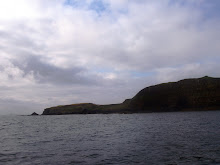Wednesday, March 25, 2009
A Couple of Book Reviews
Cloud Atlas - David Mitchell
Beware of hype. That's my usual maxim with anything, be it film or TV, music, or book: the more positive spin that surrounds a product the more I am generally to be disappointed by it. There are exceptions: the Beatles and David Mitchell's 'Cloud Atlas', for example. Which is not to say there are no problems with the book (its own Maxwell's Silver Hammer, if you like) but it does provide pleasure far beyond most others out there.
It seems obvious to point out but still deserves saying that this is really a bunch of highly individualistic and genre straddling short stories. The link between them is slim, and definitely appears added on as an afterthought in a couple of cases, and I could well see how readers might be miffed by the break in the narratives. Not all the stories are as successful as each other, either, which can mean counting down the pages until, say, Timothy Cavendish returns.
For all that, it's excellent. Each voice is engrossing in its own way, and Mitchell does seem able to draw the reader in to whatever genre he is employing. The farce is funny, the 'action movie' parts suitably drama packed and the science fiction strange enough to be interesting and thought provoking. I've found myself thinking about bits of it months later, and that's always a good sign. I can even imagine myself coming back and re-reading it a few years down the line, which is something I rarely do, to see how interlocked the stories are with knowledge of how each narrative ends.
Naomi Klein - The Shock Doctrine
It's a well written, moving, exhaustive and endlessly informative work. More than that, it's stuff that is important to know. Klein deals with the disaster capitalism complex that exploits tragedy the world over and grabs what it can for itself leaving little for those in the greatest need. She carefully builds a case against the actions of those participating and those who have driven it forward for the past fifty years through torture, coups and the suppression of freedoms. Of course, it's based on her opinion and for every excoriating expose of unfair practices she highlights, defenders of the movement (free traders, neo-cons) could argue against it, and surely will. This is far from merely an opinion piece though: she adds references and footnotes extensively and brings in arguments from economists, politicians and people from within the business world (including former free traders). By the close, she has made a very strong argument that disaster capitalism is not only anti-democratic and destructive to countries where it has been employed, but actively courts disasters to gain control over new 'markets'.
